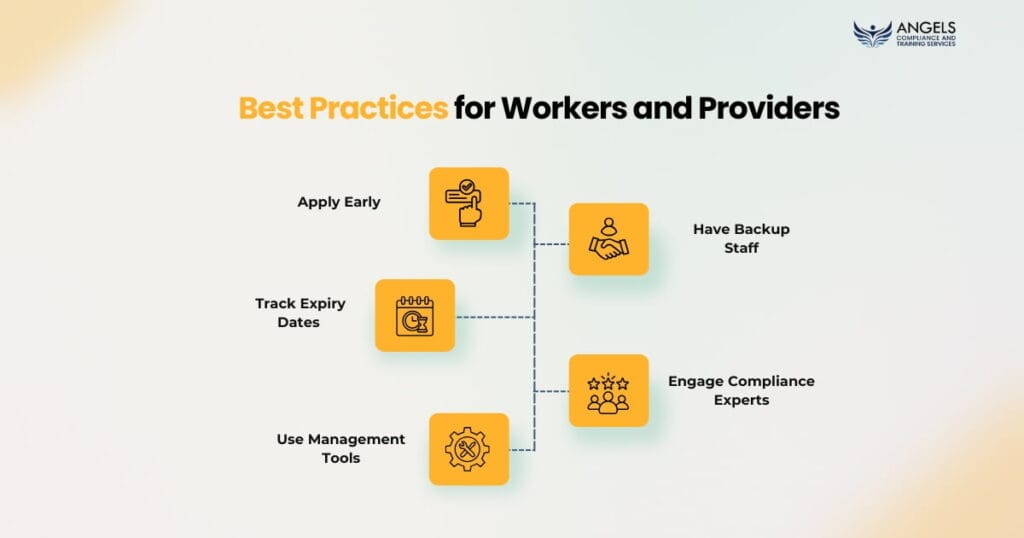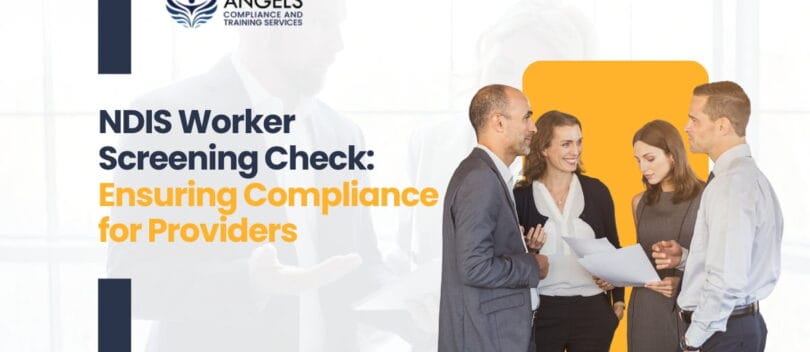Introduction
In the disability support sector, safety and trust aren’t optional, they’re essential. For workers supporting people with disabilities under the National Disability Insurance Scheme (NDIS), the NDIS worker screening check is one of the most important steps in building that trust. This process ensures that only suitable individuals work in risk-assessed roles, protecting participants while maintaining the integrity of the NDIS.
At Angels Compliance and Training Services, we understand that navigating NDIS compliance can feel complex, especially when it comes to meeting screening obligations for your workforce. That’s why we work with providers across Australia to simplify the process, guide them through registration and renewal, and ensure they’re always audit-ready.
What Is the NDIS Worker Screening Check?
The NDIS worker screening check is a nationally consistent assessment designed to determine whether a person poses any risk to people with disabilities. Unlike a basic police check, it considers a broader range of factors including criminal history, workplace misconduct, and other relevant information before granting clearance.
This process forms a key safeguard under the NDIS Quality and Safeguards Framework, and for providers, it is non-negotiable. Failing to meet screening requirements can result in compliance breaches, which may affect service delivery and your provider registration status.
Who Needs It & Who Can Opt In
Mandatory for Registered Providers
If you work for a registered NDIS provider and your role involves direct contact with participants, such as providing personal care, community access, therapy assistance, or behaviour support you’ll need a valid clearance before starting. This also applies to key personnel within the organisation, like directors or senior managers who influence service delivery.
Voluntary for Unregistered Providers
While unregistered providers aren’t legally required to conduct the screening, many choose to. Doing so strengthens their reputation, demonstrates commitment to participant safety, and may make it easier to secure work or contracts in the future.
Regional Considerations – WA
In Western Australia, the NDIS workers screening check WA follows the same national framework but is processed by the state’s own screening unit. Fees, application processes, and verification timelines may differ slightly compared to other states.
Applying for the NDIS Worker Screening Check – Step by Step
1. Application Submission
Begin by applying through your state or territory’s Worker Screening Unit (WSU) website. You’ll need personal details, identity documents, and your employer’s information.
2. Identity Verification
Upload or present original identification to meet 100-point ID requirements. This may include passports, driver’s licences, or proof of address documents.
3. Employer Verification
Your employer or prospective employer must verify that you are applying for a role that requires the screening. Without this verification, your application won’t proceed.
4. Risk Assessment Process
The screening unit conducts a detailed risk assessment, looking at criminal history, workplace misconduct findings, and other relevant records.
5. Outcome Notification
You’ll receive either a clearance or an exclusion notice. Your employer will also be informed of the result.
Processing times can vary; some applicants receive clearance within days, while others may wait weeks. Delays often occur if further information is required or if criminal history checks take longer.
Tip from Angels Compliance and Training Services: Begin the screening process well before onboarding new staff to avoid rostering delays and ensure compliance from day one.
NDIS Worker Screening Check Costs and Validity
The cost of the screening varies between states and territories. For example:
- Queensland: approx. $138
- Victoria: approx. $128.20
- Western Australia: approx. $145 for paid workers
Clearance is valid for up to five years, provided no new concerning information arises. However, if issues occur during that time, such as new criminal charges, the clearance can be suspended or revoked.
Can You Work While Waiting?
Rules differ by location. In some states, workers may begin under supervision while awaiting clearance, provided they’ve lodged their application. In others, you must wait until clearance is granted before starting work. Providers should confirm local regulations to avoid compliance breaches.
It’s essential to check your state’s specific regulations before taking on participant shifts.
The Consequences of Non-Compliance
Failing to ensure staff have valid and current screening clearances can have serious consequences for both workers and providers, including:
- Breaching NDIS Code of Conduct requirements
- Failing NDIS audits
- Damage to organisational reputation
- Potential suspension of services
Providers should maintain a robust compliance tracking system to avoid accidental lapses.
Best Practices for Workers and Providers

- Apply Early – Start the process as soon as you are offered (or are considering) a role that requires clearance.
- Track Expiry Dates – Keep reminders for when your clearance is due to expire.
- Use Management Tools – Many organisations use workforce management software to track compliance and send alerts.
- Have Backup Staff – Providers should maintain a roster of pre-cleared staff to avoid service interruptions.
- Engage Compliance Experts – Partnering with specialists like Angels Compliance and Training Services can save time, reduce errors, and strengthen audit outcomes.
Exceptions for an NDIS Worker Screening Check
While the NDIS worker screening check is a crucial compliance requirement, there are limited circumstances where it may not be mandatory. However, these exceptions must be approached with caution, as they depend on the worker’s role, the nature of participant contact, and state or territory laws.
1. Non-Risk Assessed Roles
If a role does not meet the definition of “risk-assessed” under the NDIS Practice Standards meaning the worker does not have more than incidental contact with participants, does not handle sensitive participant information, and does not have decision-making authority over support delivery the screening check may not be required.
Example: Administrative staff who work in an office with no direct contact with participants or their personal information.
2. Supervised Workers
Some states allow new workers to start in a risk-assessed role without clearance, provided they are under direct supervision at all times and have lodged their screening application. The supervision must be continuous, and the worker cannot perform tasks alone with a participant.
Note from Angels Compliance and Training Services: While legally permissible in certain jurisdictions, this approach should be used sparingly to minimise compliance risks.
3. Existing State/Territory Clearances
In some cases, workers who hold equivalent state-based clearances such as a working with children check or aged care clearance may not need to apply for a new screening immediately. However, they must still be registered on the National Worker Screening Database and meet NDIS standards.
4. Short-Term or Incidental Contact
If a worker’s contact with participants is purely incidental and limited such as a tradesperson making one-off repairs they may not require a clearance. That said, many providers still choose to screen all staff for consistency and participant reassurance.
5. Transitional Arrangements for Certain Workers
When new rules or registration requirements come into effect, transitional arrangements may be put in place allowing certain workers to continue in their roles for a defined period before obtaining their clearance.
Important Compliance Reminder:
Even when an exception applies, providers are still responsible for ensuring the safety of participants. At Angels Compliance and Training Services, we advise providers to document any exception clearly, justify the reasoning, and have alternative safeguarding measures in place such as supervision or limited role access to protect both participants and the organisation during audits.
Regional Spotlight: NDIS Workers Screening Check WA
Western Australia operates its own screening process through the Department of Communities. Applications are submitted online, and most paid worker checks cost around $145. While the criteria are aligned with national standards, local processes such as verification steps or payment methods can differ slightly.
Applicants in WA can also link their clearance to multiple employers through the Worker Screening Database, making it easier to work with more than one provider without reapplying.
Frequently Asked Questions
When should I start the check?
As soon as you know you’ll be working in a risk-assessed role. Early applications prevent start-date delays.
What happens if I’m denied?
You’ll receive an exclusion notice and have the right to appeal through your state’s screening authority.
Do I need a new check if I change employers?
No, clearance is portable between employers, provided it’s valid and the new role meets the same criteria.
Will I receive a certificate?
No physical certificate is issued; clearance status is recorded in the National Worker Screening Database.
Conclusion
The NDIS workers screening check is more than just a regulatory formality, it’s a critical safeguard that underpins participant safety and provider credibility. For NDIS providers, meeting these requirements is a core part of maintaining compliance, passing audits, and sustaining registration.
At Angels Compliance and Training Services, we specialise in helping providers stay ahead of their obligations. From managing screening checks to guiding you through registration, renewal, and audits, we ensure your business remains compliant, confident, and ready to deliver quality support.
